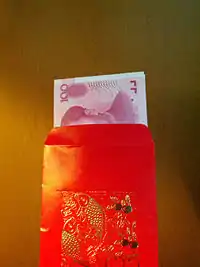英语
词源

裝飾用的紅包

裝有錢的紅包
发音
名词
(複數)
- 紅包;壓歲錢
- 1980, B. Michael Frolic, “Notes [Notes to Pages 50–65]”, 出自 ’s People: Sixteen Portraits of Life in Revolutionary China [毛澤東時代的人民:革命時期的十六幅中國生活寫照], Cambridge, Mass., London: , →ISBN, note 8,頁號 269:
- In the old days gifts of money were given to children by the older generation and were placed in red envelopes called hong bao. This practice has been discouraged by the Communists because it perpetuates "feudal-capitalist consciousness," the worship of wealth and money.
- 過去長輩們會把壓歲錢放在叫做紅包的紅色信封裡送給小孩們。但共產黨當局禁止這種行為,因為它延續了“封建-資本主義意識”,即對財富和金錢的崇拜。
- 1988 January–February, Suzanne L. Murphy, “Island Hopping: Singapore’s Chingay Parade: Music, Muscle and Make-Believe”, 出自 Nancy Zimmerman 編, Islands: An International Magazine, Santa Barbara, Calif.: Islands Publishing Company, →ISSN, →OCLC,頁號 79,列號 1:
- New Year's Eve is the traditional date for reunion dinners, but relatives and old friends enjoy getting together for feasting and entertainment throughout the entire holiday season. Gift giving is another time-honored custom still widely practiced among Singapore's Chinese. Hong bao, or "lucky money," is by far the favored item, bestowed in bright red envelopes by married family members upon the young and single.
- 傳統上團圓飯是在除夕吃的,不過整個春節期間,親戚老友們都會齊聚一堂、吃喝玩樂。送禮是另一個由來已久的習俗,至今仍在新加坡華人間廣泛流傳。紅包或“壓歲錢”——已婚的家庭成員送給年輕人和單身人士的淺紅色信封——是迄今為止最受歡迎的禮物。
- 1997, Douglas D. Daye, “Ethnic Profile: The Chinese”, 出自 A Law Enforcement Sourcebook of Asian Crime and Cultures: Tactics and Mindsets, Boca Raton, Fla., New York, N.Y.: , →ISBN,頁號 190:
- After extensive negotiations, and at the arrival of the groom at the bride's house, the groom is usually admitted only after he offers a red envelope (hong bao) containing money in multiples of 99 or 999. Those numbers symbolize a long, happy marriage.
- 經過多方協商,在新郎到新娘家時,要先給一個裝著99或999倍數金額的紅包,才能進去。這些數字意味著長久幸福的婚姻。
- 1997 May, Goh Pei Ki, compiler, “Prologue”, 出自 Koh Kok Kiang(譯者), Origins of Chinese Festivals (Asiapac Comic), 13th版, Singapore: , 出版於 April 2004, →ISBN,頁號 1:
- Children in particular love the joyous festivals. With them come treats like traditional New Year goodies (and hongbaos) during the Lunar New Year, a wide variety of rice dumplings to savour during the Dragon Boat Festival, and pretty lanterns to carry in dark places during the Mid-Autumn Festival.
- 孩子們尤其喜歡喜慶的節日。過節的時候,像農曆新年有糖果(和紅包),端午節有各種粽子,中秋節可以在暗黑的地方舉著漂亮的燈籠。
- 2005, Tiger Tong [et al.], “China”, 出自 China Business Guide, 3rd版, Singapore: China Knowledge Press, →ISBN,頁號 27,列號 1:
- Firecrackers are let off to usher in the New Year and to drive off bad luck and evil spirits. The next morning is spent visiting relatives and friends and exchanging greetings and good wishes for the year ahead. The Chinese also exchange hongbao hóngbāo or little red envelopes stuffed with money for good luck.
- 放鞭炮是为了迎接新的一年,驱除厄运和恶灵。第二天早上走亲访友,互致问候,祝福新的一年。中国人还互赠红包(装满钱的小红信封)以求好运。
- 2017, “China and the Next Production Revolution”, 出自 The Next Production Revolution: Implications for Governments and Business, Paris: , →ISBN,頁號 405:
- When Chinese return home for the Spring Festival […] they will probably also prepare hongbao for the family. Traditionally these are gifts of money packed in red envelopes given and received with ceremonial reverence. But now hongbao are available in the form of social applications. In 2015, WeChat, China's most popular messaging application, developed by Tencent, collaborated with China Central TV (CCTV) in the most watched lunar new year's gala ever, in which at certain times the host asked the audience to shake their mobile phones to receive hongbao. Over 1 billion hongbao were sent and received.
- 当中国人过春节回家时 […] 他们可能还会为家人准备红包。传统上,红包是装在红色信封里的金钱礼物,受赠者带着礼仪性的崇敬收受。但现在红包以社交应用的形式出现。2015年,由腾讯开发的中国最受欢迎的通讯应用程序微信,与中央电视台(CCTV)合作举办了有史以来收视率最高的春节联欢晚会,主持人在特定时间要求观众摇动手机以接收红包。发送和接收的红包总数超过10亿。
- 2018, Lei Tan, “Neither Gift nor Payment: The Sociability of Instrumentality”, 出自 The Global Encyclopaedia of Informality: Understanding Social and Cultural Complexity (Fringe), 卷 1, London: , , →ISBN, section 2.3 (Hongbao (China)),頁號 136:
- The sum of money in the hongbao is not fixed and it is based on the relationship between the giver and recipient, i.e. the closer the relationship, the greater the sum of money given. The hongbao culture is also commonly found in other Chinese societies; analogous practices include lishi in Hong Kong and ang pow in Singapore.
- 紅包內附金額的數量不是固定的,而是根據給予者與受贈者的關係而有所不同,也就是說,一般關係越親,收到的錢也就越多。紅包文化在其他地方的華人社會也很常見;類似的做法包括香港的“利是”和新加坡的“紅包(ang pow)”。
- 2018 2月 14, Yujing Liu, “Want a big hongbao this Lunar New Year? Map shows China’s ‘most and least generous’ provinces [農曆年想要個大紅包?這幅地圖帶您了解中國給紅包“最大方和最小氣”的省份]”, 出自 , Hong Kong: South China Morning Post Publishers, →ISSN, →OCLC,於12 November 2020歸檔自原頁面:
- Want a big hongbao this Lunar New Year? Map shows China’s ‘most and least generous’ provinces [title]
- 農曆年想要個大紅包?這幅地圖帶您了解中國給紅包“最大方和最小氣”的省份[標題]
其他形式
参考资料
- ↑ “hongbao, n.”, OED Online
 , Oxford, Oxfordshire: Oxford University Press, September 2021; “hongbao, n.”, Lexico, Dictionary.com; Oxford University Press, 2019–present.
, Oxford, Oxfordshire: Oxford University Press, September 2021; “hongbao, n.”, Lexico, Dictionary.com; Oxford University Press, 2019–present.
延伸阅读
 在英語維基百科上的資料。維基百科 en
在英語維基百科上的資料。維基百科 en
印尼语

hongbao
词源
借自官話 / ()。的同源對似詞。
发音
- 國際音標(幫助):/hoŋ.bao/
- 斷字:hong‧bao
名词
(第一人稱所有格,第二人稱所有格,第三人稱所有格)
This article is issued from Wiktionary. The text is licensed under Creative Commons - Attribution - Sharealike. Additional terms may apply for the media files.